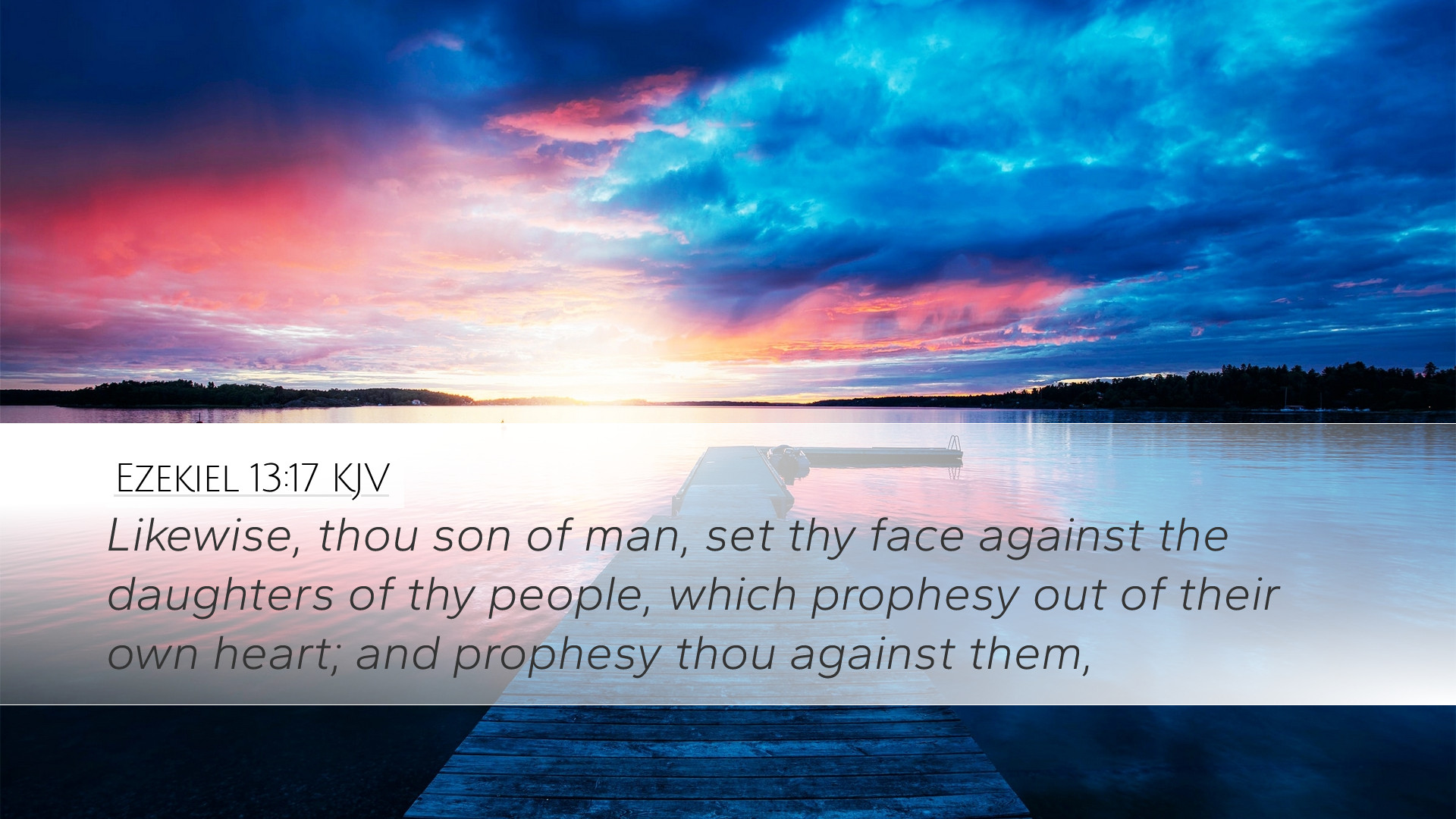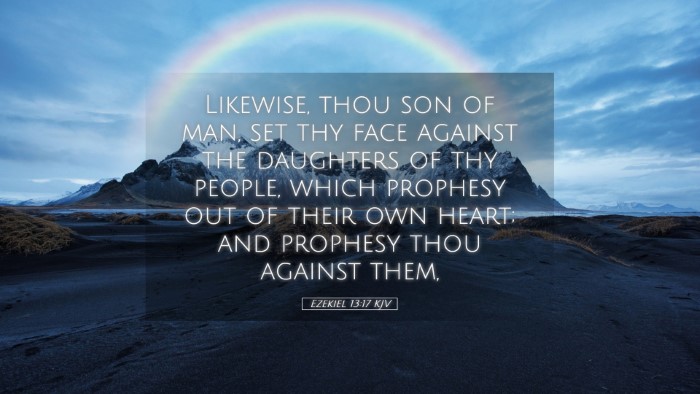Commentary on Ezekiel 13:17
Ezekiel 13:17 states, "Likewise, son of man, set thy face against the daughters of thy people, which prophesy out of their own heart; and prophesy thou against them." This verse addresses a significant issue within the context of prophetic authority and the integrity of religious communication in Israel.
Overview
The Lord commands Ezekiel to confront false prophets, specifically focusing on the daughters of the people, who are presumably engaging in misleading prophecies. This passage reveals the divine disapproval of self-appointed prophets who speak from their own imaginations rather than from divine revelation.
Insights from Public Domain Commentaries
Matthew Henry’s Commentary
Matthew Henry emphasizes the importance of true prophecy rooted in divine inspiration. He notes that the "daughters of thy people" indicates that false prophesying has extended to women, suggesting a broader societal acceptance of error. He writes, "They prophesied out of their own hearts" and stresses that such activities are contrary to the will of God. Henry concludes that God is concerned about whom He allows to speak for Him and how the messages they convey can lead the people astray. The prophet's role is to bring them back to the truth.
Albert Barnes’ Notes on the Bible
Albert Barnes delves into the nature of the prophecies presented by these women. He interprets their messages as stemming from personal desires rather than divine truth. Barnes argues that the phrase "prophesy out of their own heart" indicates a significant deviation from the established norms of prophetic integrity. He reminds readers that true prophecy must align with God's will and commands. Barnes also notes that the command to set Ezekiel's face against these false prophets illustrates God's burden against misrepresentation and the need for faithful witnesses in all ranks of society.
Adam Clarke’s Commentary
Adam Clarke offers a detailed analysis of the socio-religious context in which these prophecies occurred. He identifies these women as perhaps being motivated by societal pressures or cultural traditions that elevated their voices in the religious dialogue despite their messages' falsehood. Clarke states, "They speak smooth things to the people, and thereby confirm them in their sins." He highlights that prophetic responsibility transcends gender, but insists that the message must remain aligned with God's truth. Clarke warns that the allure of an agreeable message can lead many astray, prompting the need for prophetic voices to confront and challenge.
Theological Implications
-
Authority of Prophets: The command given to Ezekiel highlights the necessary distinction between God’s anointed prophets and those who presume to speak without divine calling. It reaffirms the weightiness of prophetic authority, which must align with God's will.
-
Integrity of the Message: The integrity of any prophetic message must derive from God, not human emotion or desire. The passage serves as a warning against the seductive nature of messages that cater to contemporary desires rather than truth.
-
Gender Dynamics in Prophecy: The mention of women in this context opens up discussions about gender roles in church leadership and speaking authority, challenging the church to consider the implications of who communicates spiritual truths.
Practical Applications
For pastors, students, theologians, and Bible scholars, this passage serves as a crucial reminder of the need for discernment in ministry. False teachings can arise from many places, including those traditionally viewed as marginalized within religious communities.
Discernment: It is imperative to evaluate teachings against Scripture consistently. False prophets can be charismatic and persuasive, and congregations should be taught to test all spirits to see if they align with biblical truth (1 John 4:1).
Encouragement of True Prophets: Just as Ezekiel was mandated to confront error, today’s leaders must encourage genuine prophetic voices. This involves providing a platform for those preaching the Holiness of God and demanding accountability from those who claim to speak on behalf of the Lord.
Conclusion
Ezekiel 13:17 serves as a powerful exhortation for both individual believers and the broader Church community. The need to recognize true prophets and the pitfalls of false prophecy is as critical today as it was in Ezekiel's time. The contributions from esteemed commentators such as Matthew Henry, Albert Barnes, and Adam Clarke illuminate the complex dynamics of prophecy, authority, and integrity, prompting an essential reflection on the current state of prophetic voices in our culture.


